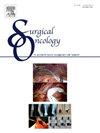原发性肝细胞癌的小切除可促进复发性治疗
IF 2.4
4区 医学
Q3 ONCOLOGY
引用次数: 0
摘要
背景:肝细胞癌(HCC)原发性肝切除术的范围可能影响长期预后,尤其是复发时。我们调查了最初的小肝切除术或大肝切除术是否会影响复发后的再治疗选择和生存。方法回顾性分析原发性肝细胞癌(HCC)患者首次行大肝切除术或小肝切除术。结果分析包括总生存期(OS)和复发后总生存期(OS- r)。采用倾向评分匹配(PSM)分析预后因素。结果在1836例复发患者中,873例匹配病例在psm后被分析。小肝切除术组5年、10年和15年的粗总生存率分别为86.5%、73.9%和61.5%,大肝切除术组分别为76.8%、67.6%和62.7% (p < 0.001)。在匹配病例中,两组之间的OS-R具有可比性。OS-R的预后因素包括肿瘤初始分期、复发性白蛋白-胆红素评分、复发伴血管侵犯或肝外转移以及选择的复发治疗。原发性小肝切除术后,更多的患者接受再切除或局部消融作为复发治疗,并且能够获得更好的结果。结论两组患者的复发率和术后生存率相近,小范围肝切除术可保留更大的肝容量,使更多的患者在复发后接受进一步的根治性治疗。小肝切除术提供了更好的再治疗选择和潜在的更好的长期生存。本文章由计算机程序翻译,如有差异,请以英文原文为准。
Minor resection for primary hepatocellular carcinoma promotes curative recurrent treatments
Background
The extent of primary hepatectomy for hepatocellular carcinoma (HCC) may influence long-term outcomes, especially at recurrence. We investigated whether initial minor or major hepatectomy impacts retreatment options and survival following recurrence.
Methods
We retrospectively reviewed patients with primary HCC who underwent either initial major or minor hepatectomy. Outcomes analyzed included overall survival (OS), and post-recurrence overall survival (OS-R). Prognostic factors were analyzed using propensity score matching (PSM).
Results
Among 1836 patients experienced recurrence, 873 matched cases were analyzed post-PSM. The crude 5-, 10-, and 15-year OS rates were 86.5 %, 73.9 %, and 61.5 %, respectively, in the minor hepatectomy group, and 76.8 %, 67.6 %, and 62.7 %, respectively, in the major hepatectomy group (p < 0.001). OS-R was comparable between the two groups among the matched cases. The prognostic factors for OS-R included the initial cancer stage, recurrent albumin–bilirubin score, recurrence with vascular invasion or extrahepatic metastases, and the selected recurrent treatment. More patients after primary minor hepatectomy underwent re-resection or local ablation as recurrent treatment, and were able to achieve better outcomes.
Conclusions
While recurrence rates and post-recurrence survival were similar between groups, minor hepatectomy may preserve greater liver volume, enabling more patients to receive further curative treatments upon recurrence. Minor hepatectomy offers better retreatment options and potentially better long-term survival.
求助全文
通过发布文献求助,成功后即可免费获取论文全文。
去求助
来源期刊

Surgical Oncology-Oxford
医学-外科
CiteScore
4.50
自引率
0.00%
发文量
169
审稿时长
38 days
期刊介绍:
Surgical Oncology is a peer reviewed journal publishing review articles that contribute to the advancement of knowledge in surgical oncology and related fields of interest. Articles represent a spectrum of current technology in oncology research as well as those concerning clinical trials, surgical technique, methods of investigation and patient evaluation. Surgical Oncology publishes comprehensive Reviews that examine individual topics in considerable detail, in addition to editorials and commentaries which focus on selected papers. The journal also publishes special issues which explore topics of interest to surgical oncologists in great detail - outlining recent advancements and providing readers with the most up to date information.
 求助内容:
求助内容: 应助结果提醒方式:
应助结果提醒方式:


